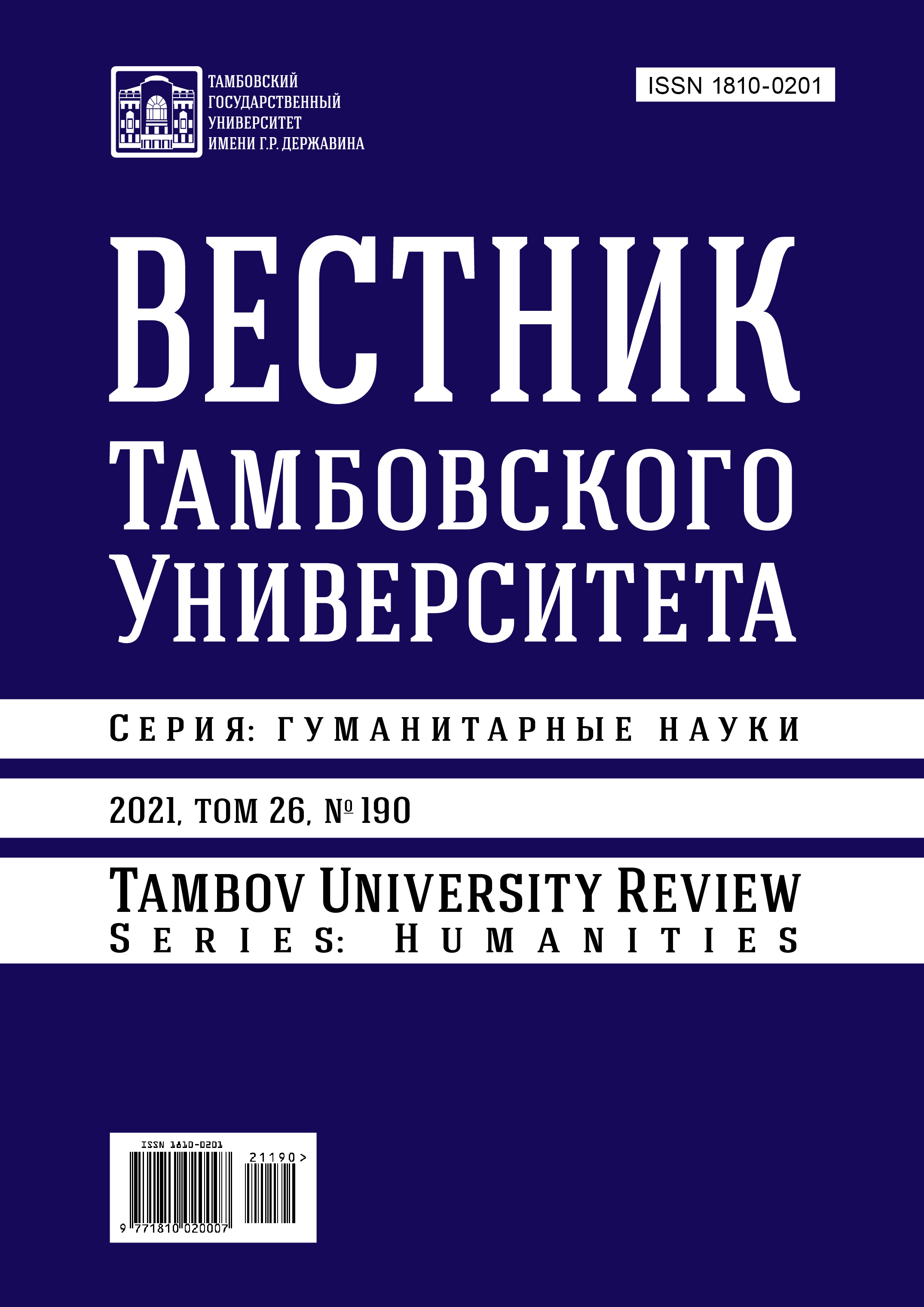Implementation of game technologies in distance learning of Russian as a foreign language
- Authors: Kholodkova M.V.1, Zherebtsova Z.I.1, Dyakova T.A.1
-
Affiliations:
- Derzhavin Tambov State University
- Issue: Vol 26, No 190 (2021)
- Pages: 79-89
- Section: THEORY AND METHODS OF TEACHING RUSSIAN AS A FOREIGN LANGUAGE
- URL: https://journal-vniispk.ru/1810-0201/article/view/298334
- DOI: https://doi.org/10.20310/1810-0201-2021-26-190-79-89
- ID: 298334
Cite item
Full Text
Abstract
The possibilities of implementing game technologies for distance learning of Russian as a foreign language using online services are considered. The relevance of the work is due to the development of education digitalization and the high didactic potential of gaming. The purpose of this study is to formulate guidelines for the selection of Web 2.0 services for the implementation of gaming technologies aimed at the development of linguistic, communicative, linguistic-cultural competences of foreign students in the course of distance learning of their Russian language. The study analyzed the techniques and methods of using online game tasks in teaching Russian as a foreign language from the standpoint of the following features: methodic tasks, distance learning format, the number of players, the presence of automatic verification of answers, the nature of the choice, the presence of a creative component, the possibility of instant switching of the game template within one content, translation features. It is concluded that many traditional game techniques that have become habitual in face-to-face work can be applied in distance learning. Online tools make it possible to organize manipulative play activities, team play, and communication in a digital environment in a form that is fun for students. The results of this study are essential both for understanding the methodoic features of the organizing distance learning process in general, and for the effective use of gaming technologies when teaching Russian to foreigners.
About the authors
M. V. Kholodkova
Derzhavin Tambov State University
Email: mvholodkova@yandex.ru
ORCID iD: 0000-0003-0335-9804
Candidate of Philology, Associate Professor, Associate Professor of Russian Language as a Foreign Department
392000, Российская Федерация, г. Тамбов, ул. Интернациональная, 33Z. I. Zherebtsova
Derzhavin Tambov State University
Email: zherebtsova@inbox.ru
ORCID iD: 0000-0002-3831-2937
Candidate of Pedagogy, Associate Professor, Associate Professor of Russian Language as a Foreign Department
33 Internatsionalnaya St., Tambov 392000, Russian FederationT. A. Dyakova
Derzhavin Tambov State University
Author for correspondence.
Email: larionova86@mail.ru
ORCID iD: 0000-0003-1032-5573
Candidate of Pedagogy, Associate Professor, Deputy Dean of the Faculty of Philology and Journalism for Research, Associate Professor of Russian Language as a Foreign Department
33 Internatsionalnaya St., Tambov 392000, Russian FederationReferences
- Timoshkina N.V. Internet-servisy v rabote pedagoga [Internet Services in the Work of a Teacher]. Ulyanovsk, 2019, 102 p. (In Russian).
- Danilenko S.V., Martynyuk Y.M., Gerbut S.S. Metodicheskiye osobennosti ispol’zovaniya internet-servisov v razrabotke kontenta elektronnykh obrazovatel’nykh resursov [Methodological features of the use of internet services in the development of the content of electronic educational resources]. Vestnik Nizhegorodskogo universiteta im. N.I. Lobachevskogo. Seriya: Sotsial’nyye nauki – Vestnik of Lobachevsky State University of Nizhny Novgorod. Series: Social Sciences, 2019, no. 2 (54), pp. 158-165. (In Russian).
- Podolyan A.S., Zhogan E.V. Ispol’zovaniye igrovoy platformy Kahoot! kak sredstva kontrolya usvoyeniya znaniy po grammatike inostrannogo yazyka v vuze [Using the Kahoot! Gaming platform as a means of con-trolling the acquisition of knowledge of the foreign language grammar at university]. Sovremennyye nauchnyye issledovaniya i razrabotki – Modern Research and Development, 2019, no. 12 (29), pp. 707-712. (In Russian).
- Wang A., Tahir R. The effect of using Kahoot! for learning – a literature review. Computers and Education, 2020, vol. 149. doi: 10.1016/j.compedu.2020.103818
- Ledeneva E.M. Formirovaniye inoyazychnoy grammaticheskoy kompetentsii studentov vuza pri pomoshchi onlayn-servisa Quizlet [Forming foreign language grammatical competence of university students using the online service Quizlet]. Vestnik Altayskogo gosudarstvennogo pedagogicheskogo universiteta – Vestnik of Altai State Pedagogical University, 2019, no. 4 (41), pp. 11-17. (In Russian).
- Komissarova O.P. Ispol’zovaniye modulya interaktivnykh elementov H5P dlya otsenki kompetentsiy stu-dentov [The use of the module H5P interactive elements to assess the competence of students]. Sinergiya nauk – Synergy of Sciences, 2018, no. 28, pp. 1173-1178. (In Russian).
- Tabachuk N.P. Servis Wizer.me kak sredstvo razvitiya informatsionnoy kompetentsii studentov [Service Wiz-er.me as a means of developing students’ information competence]. Sovremennyye tendentsii razvitiya nauki i tekhniki – Modern Trends in the Development of Science and Technology, 2017, no. 1-9, pp. 114-116. (In Rus-sian).
- Zainuddin Z., Shujahat M., Haruna H., Chu S.K.W. The role of gamified e-quizzes on student learning and en-gagement: an interactive gamification solution for a formative assessment system. Computers and Education, 2020, vol. 145, doi: 10.1016/j.compedu.2019.103729
- Wang A. The wear out effect of a game-based student response system. Computers and Education, 2015, vol. 82, pp. 217-227. doi: 10.1016/j.compedu.2014.11.004
- Sekhavat Y.A. Collaboration or battle between minds? An attention training game through collaborative and competitive reinforcement. Entertainment Computing, 2020, vol. 34. doi: 10.1016/j.entcom.2020.100360
- Nazarenko A.L. Information and Communication Technologies in Foreign Language Teaching: Distance Learning. Moscow, Moscow University Press, 2013, 271 p. (In Russian).
- Lebedeva M.Y. Proyektirovaniye interaktivnosti v tsifrovykh uchebnykh sredakh (na primere sistemy distant-sionnogo obucheniya RKI) [Designing interaction in digital educational environment: as exemplified by distant Russian as foreign language course)]. Dinamika yazykovykh i kul’turnykh protsessov v sovremennoy Rossii – Dynamics of Language and Cultural Processes in Modern Russia, 2016, no. 5, pp. 1879-1883. (In Russian).
- Popova T.I. (ed.). Metodika provedeniya onlayn-uroka v ramkakh pedagogiki sotrudnichestva [Methods of conducting an online lesson within the framework of cooperation pedagogy]. St. Petersburg, 2019, 90 p. (In Rus-sian).
- Lebedeva M.Y., Kuvayeva A.S. Sinkhronnyy onlayn-urok po RKI kak osobaya forma obucheniya v tsifrovoy srede [Synchronous online RSL lesson as a specific teaching and learning form in the digital educational envi-ronment]. Russkiy yazyk za rubezhom – Russian Language Abroad, 2020, no. 2 (279), pp. 27-33. (In Russian).
- Artino A.R. Emotions in online learning environments. The Internet and Higher Education, 2012, vol. 15, no. 3, pp. 137-140. doi: 10.1016/j.iheduc.2012.04.001 (In Russian).
- Ushatikova I.I. Igropedagogika [Game Pedagogy]. Cheboksary, 2019, 144 p. (In Russian).
Supplementary files









